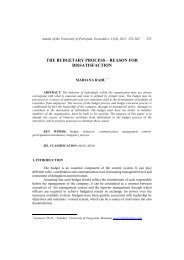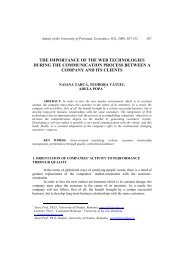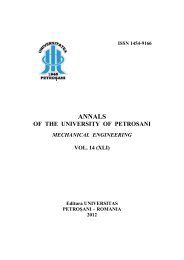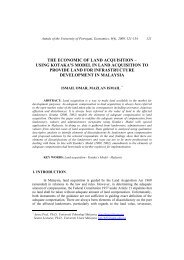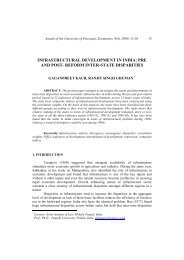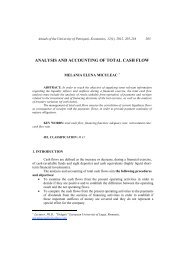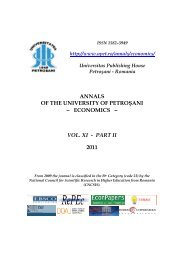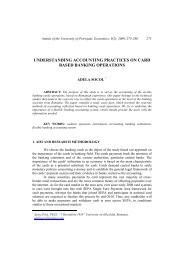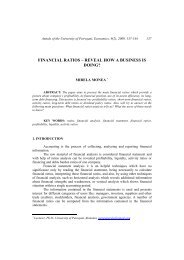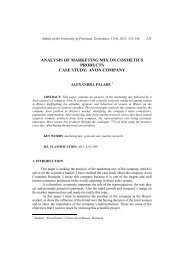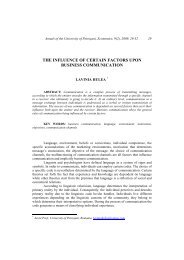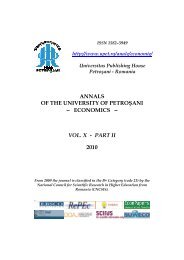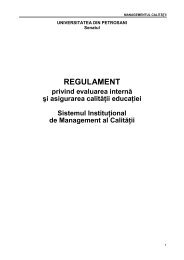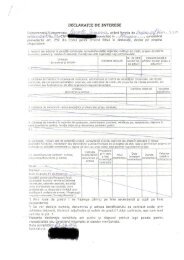annals of the university of petroÅani â¼ economics â¼ vol. xi - part i ...
annals of the university of petroÅani â¼ economics â¼ vol. xi - part i ...
annals of the university of petroÅani â¼ economics â¼ vol. xi - part i ...
Create successful ePaper yourself
Turn your PDF publications into a flip-book with our unique Google optimized e-Paper software.
166 Mutengezanwa, M.; Gombarume, F.B.; Njanike, K.; Charikinya, A.<br />
Table 1. The efficiency <strong>of</strong> lending approaches<br />
Approach Poverty lending Financial systems<br />
Response Good Fair Poor Good Fair Poor<br />
Frequency 40 20 20 30 40 10<br />
Percentage 50 25 25 37.5 50 12.5<br />
As depicted in table 1 above 50% <strong>of</strong> <strong>the</strong> respondents indicated that <strong>the</strong> poverty<br />
lending approach was good, whilst 25% indicated that it was fair and <strong>the</strong> rest felt that it<br />
was poor. As for <strong>the</strong> financial systems approach 50% <strong>of</strong> <strong>the</strong> respondents indicated it<br />
was fair whilst 37.5 % indicated that it was good. Although <strong>the</strong> lending approach<br />
ensures that financial services reach <strong>the</strong> targeted clients, it is <strong>of</strong>ten unsustainable<br />
because it is highly subsidized and may not be driven by business motives, but based<br />
purely on humanitarian grounds.<br />
4.2. The role <strong>of</strong> micro finance institutions<br />
The research also sought to establish <strong>the</strong> role <strong>of</strong> MFIs. The results from <strong>the</strong><br />
questionnaires are shown below:<br />
Table 2. The role <strong>of</strong> MFIs<br />
Description<br />
MFIS <strong>of</strong>ten try to:<br />
Agree<br />
(%)<br />
Not Sure<br />
(%)<br />
Disagree<br />
(%)<br />
Increase social interaction and linkages 70 15 15<br />
Negotiate on behalf <strong>of</strong> poor people 20 40 40<br />
Empower <strong>the</strong> poor and <strong>the</strong> marginalized 55 15 30<br />
Use resources to develop <strong>the</strong> community 20 60 20<br />
Integrate activities with those <strong>of</strong> welfare and 65 25 20<br />
humanitarian centered NGOs<br />
Create organizations owned by people who<br />
cater for poor people’s needs<br />
85 8 7<br />
The data collected was focused on determining whe<strong>the</strong>r <strong>the</strong> operations <strong>of</strong><br />
Micro Finance Institutions bring about socio economic sustainability. The table above<br />
shows that most <strong>of</strong> <strong>the</strong> respondents agreed that MFIs have a role to play in <strong>the</strong><br />
socioeconomic lives <strong>of</strong> people notably through creating organizations owned by people<br />
who cater for people’s needs (85%). People cantered institutions are <strong>the</strong> basis for a<br />
thriving democracy and play critical role in empowering <strong>the</strong> poor. Sustainable<br />
development is sometimes brought through integration <strong>of</strong> activities <strong>of</strong> MFIs with those<br />
<strong>of</strong> NGOs centred on welfare and humanitarian.<br />
Responses obtained from <strong>the</strong> questionnaires indicated that increase in social<br />
interaction and linkages (70%) was also a significant role played by MFIs while 65%<br />
indicated that integrating activities with those <strong>of</strong> welfare and humanitarian cantered<br />
NGOs was major. Sustainability is brought about through cooperation and positive<br />
competition.



